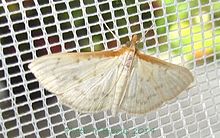Hodebertia
| Hodebertia | |
|---|---|

| |
| Scientific classification | |
| Domain: | Eukaryota |
| Kingdom: | Animalia |
| Phylum: | Arthropoda |
| Class: | Insecta |
| Order: | Lepidoptera |
| Family: | Crambidae |
| Tribe: | Margaroniini |
| Genus: | Hodebertia Leraut, 2003[1] |
| Species: | H. testalis
|
| Binomial name | |
| Hodebertia testalis (Fabricius, 1794)
| |
| Synonyms | |
| |

Hodebertia is a genus of micro-moth of the family Crambidae. It contains only one species, Hodebertia testalis, and is found in the tropics, but ranges north to parts of Europe on occasion.
Description
[edit]Adults are white, with two ragged brown arcs across each wing.[2] The larvae feed on Hibiscus, Gomphocarpus and Asclepias species (including Asclepias curassavica).[3]
Distribution
[edit]Hodebertia testalis is an African tropical species which has been recorded in the Democratic Republic of Congo, Kenya, Madagascar, Mozambique, Réunion, Saint Helena, Somalia, South Africa and Zambia.[3] It is occasionally found in Europe and has been reported from Croatia, England (St Mary's, Isles of Scilly), France, Greece, Italy, Portugal, Spain and Switzerland.[4][5] Elsewhere it has been found in Australia (Queensland), India, Indonesia, Japan, Saudi Arabia, Sri Lanka, Syria, Taiwan and Yemen.
References
[edit]- ^ "GlobIZ search". Global Information System on Pyraloidea. Retrieved 2011-10-17.
- ^ " Pyrausta testalis (Fabricius, 1794) (also known as Hodebertia testalis)". Coffs Harbour Butterfly House. Retrieved 24 October 2023.
- ^ a b "Hodebertia testalis (Fabricius, 1794)". Afromoths.net. Retrieved 24 October 2023.
- ^ "Hodebertia testalis (Fabricius, 1794)". Fauna Europaea. Retrieved 24 October 2023.
- ^ Kimber, Ian. "1408a Hodebertia testalis". UKmoths. Retrieved 25 October 2023.
